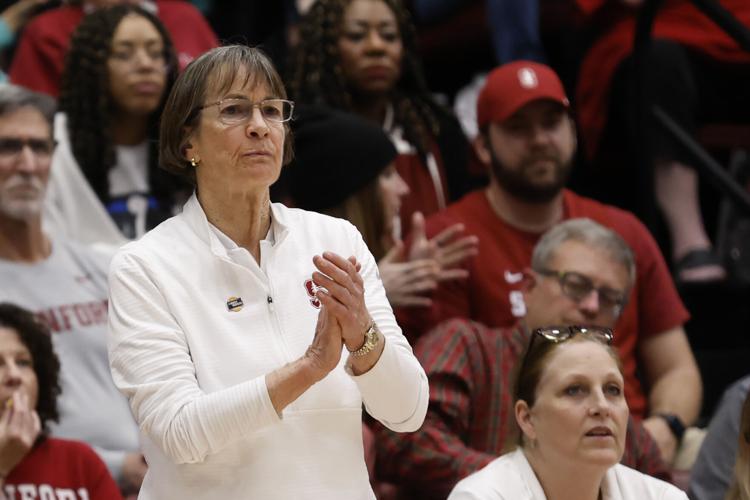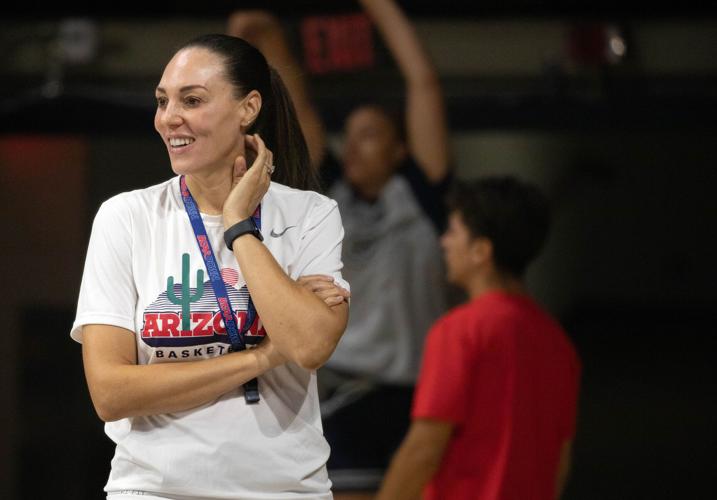LAS VEGAS — Moved to a corridor of generic Las Vegas Strip hotel ballrooms from its trendy old office building in San Francisco, the Pac-12 women’s basketball media day mostly still retained its usual atmosphere of showiness and camaraderie Tuesday.
Video and music blared. Glass-enclosed basketballs painted in team colors stared at the main stage media audience. Uniformed players bounced around between interviews, playing ping pong, pop-a-shot, chatting amiably or just checking their phones.
Questions on the main podium mostly kept up a convivial vibe, some regarding personal notes and many discussing upbeat projections about the players and coaches sitting there.
Other than what legendary Stanford coach Tara VanDerveer called a "nightmare," the league's impending demise after this season, words such as “break-up” or “realignment” or “football” or “television” were otherwise not widely heard.
“I think that was kind of by design,” Oregon coach Kelly Graves said.

Stanford coach Tara VanDerveer reacts on the sideline during the second half of the team's first-round college basketball game against Sacred Heart in the women's NCAA Tournament in Stanford, Calif. on March 17. VanDerveer enters her final season coaching in the Pac-12 Conference. The Cardinal will be in the ACC next season.
Besides, USC coach Lindsay Gottlieb said it would be a “disservice” to talk about it at a time when coaches prefer to focus on their teams and players for the season ahead.
“And none of us were really prepared to debrief everything that happened,” she said.
But it did happen. One final run in 2023-24, the league’s tight-knit participants will be heading off to the Big Ten, Big 12, ACC and, for Washington State and Oregon State, parts unknown.
“Personally, I was really disappointed,” Graves said. “The last seven or eight years, this has been the premier conference.”
It was, maybe in part at least, because they built it together. That’s the sort of thing many Pac-12 coaches preferred to talk about Tuesday when asked about the league’s break-up during the more private “breakout room” interviews.
“I mean, we used to be Tara VanDerveer and the 11 dwarfs,” UCLA coach Cori Close said. “I remember back when Mike Neighbors was the coach at University of Washington, and he came in and said `This is how we need to schedule to move our conference forward,’ … so my whole thing is just you want to you want to be a part of something bigger than yourself and you want to be a part of leaving a legacy of excellence.”

Arizona head coach Adia Barnes watches her team practice earlier this month as part of their preparation for the 2023-24 season.
UA coach Adia Barnes said her focus was only on her team and what could be the “best Pac-12 basketball in history.”
Of course, teams such as Arizona, Oregon, UCLA and USC will probably be fine, traditionally strong programs who are heading off to other power conferences with the resources to fly charter going wherever they are sent next.
Then there’s Oregon State and Washington State, left standing without a chair when the music ended, despite the Beavers having won the conference three seasons in a row and reaching the 2016 Final Four under Rueck, and despite the Pac-12 Tournament title that Kamie Ethridge guided the lightly-funded Cougars to last season.
There is no rug under them.
“I can be sad. I could get frustrated. I could be mad. I could be all those things,” Rueck said. “You know, emotions are real, and at one point I probably went through all of those. But it does me no good to stay there. That’s just the reality of it. Like, how long can you be mad? You just have to accept it. So let's make the best plays that we can make within our new reality, whatever framework that might be.”

Oregon coach Kelly Graves calls out a play during the first half of the team's NCAA college basketball game against Stanford in the quarterfinals of the Pac-12 women's tournament Thursday, March 2, 2023, in Las Vegas. (AP Photo/David Becker)
Rueck said the hardest part is the uncertainty, with he and Ethridge unable to tell recruits and their families much about the future to speak of other than what’s in their gym and on their campus. OSU and WSU might somehow reformulate the conference by adding schools, or join some other league, while a lawsuit in the state of Washington hovers over it all.
“I have to equate it to experiencing the COVID stretch where we didn't know if we were gonna practice that day,” Rueck said. “There was so much uncertainty and and most of us probably never had that much uncertainty in our day to day life. There's just things I don't know. So what can you do? You do the best with what you've got.”
Though Ethridge had no way of knowing at the time, the Cougars’ surprise run to the Pac-12 Tournament title last season was key, allowing her to at least sell recruits and their families on the idea that the Cougars, no matter what is going on around them, are making progress despite their financial limitations.
“I tell people, `We were 12th in the league in budgets, we’re 12th in the league in facilities, even though they're really nice — and we won the Pac-12 championship,' ” Ethridge said. “So it doesn’t doesn't really matter if you get the right people. We have great people.”

Washington State head coach Kamie Ethridge calls out to her team during the second half of an NCAA college basketball game against UCLA in the finals of the Pac-12 women's tournament Sunday, March 5, 2023, in Las Vegas. (AP Photo/David Becker)
But the Cougars and Beavers, and everyone else really, won’t have each other anymore as a Pac-12 unit. That’s a gut punch that even VanDerveer, who saw unparalled competition infiltrate a conference she once routinely dominated, has trouble with.
“It's heartbreaking. This has been my whole life,” VanDerveer said. “I woke up when I heard about it, and I said, I'm in a bad dream. This is a nightmare.
“But we are committed to this year being a great year. We're really thankful that we have such support in the in the Pac 12 from everyone we play. We represent great universities and we're very proud of the success that we have had. We're just gonna make it the best year ever.”
“I feel greatly privileged that I've been a part of an era of women's basketball in this conference that we can be really proud of. And there's a lot of people that have contributed to that. I think this is going to be a year to say thank you in all those ways."
VIDEO: Arizona coach Adia Barnes speaks at Pac-12 Women’s Basketball Media Day Tuesday, Oct. 10, on leadership of veterans Helena Pueyo and Esmery Martinez to the Wildcats’ 2023-24 squad. (Video courtesy Pac-12 Networks)
VIDEO: Arizona coach Adia Barnes speaks at Pac-12 Women’s Basketball Media Day Tuesday, Oct. 10, on the evolution of Kailyn Gilbert heading into this season. (Video courtesy Pac-12 Networks)
VIDEO: Arizona coach Adia Barnes speaks at Pac-12 Women’s Basketball Media Day Tuesday, Oct. 10, on “focus” of this year, which portends “some of the best Pac-12 Basketball in history.” (Video courtesy Pac-12 Networks)
VIDEO: Arizona coach Adia Barnes speaks at Pac-12 Women’s Basketball Media Day Tuesday, Oct. 10, on why the word ‘gritty’ fits as a descriptor for the Wildcats in 2023-24, as well as how she evaluates talent and builds a roster. (Video courtesy Pac-12 Networks)
VIDEO: Arizona coach Adia Barnes speaks at Pac-12 Women’s Basketball Media Day Tuesday, Oct. 10, on the heightened fan support for her Wildcats in recent years, coinciding with multiple NCAA tournament appearances and five consecutive 20-win seasons. (Video courtesy Pac-12 Networks)
VIDEO: Arizona coach Adia Barnes speaks at Pac-12 Women’s Basketball Media Day Tuesday, Oct. 10, on the Wildcats’ impactful freshmen like Breya Cunningham and Jada Williams this coming season. (Video courtesy Pac-12 Networks)
VIDEO: Arizona coach Adia Barnes speaks at Pac-12 Women’s Basketball Media Day Tuesday, Oct. 10, answering a question from former ASU head coach Charli Turner-Thorne on “greatest challenges” the Wildcats face this year, such as a shorter bench (10 players). (Video courtesy Pac-12 Networks)
VIDEO: Arizona Women's Basketball Press Conference - Adia Barnes (Oct. 2, 2023) (Arizona Athletics YouTube)









